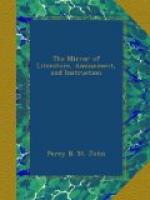“In regard to music, since the appearance of Weber, an almost new era has commenced. In the works of this celebrated composer, the proverb has been realized—the German Professor has given to his notes the power of language: emotions are almost imbibed from the sounds as from a visible transaction, or a well-told description. If the country which presents the highest or most generally approved attainments in singing, be demanded, perhaps the correct answer would be Italy. The contest afterwards for the highest eminence would lie between England, Germany, and France. The Scottish, Irish, and Welsh compositions, and English ballad music, must of course come under the aggregation of the English school, and availing itself of this union, and taking into view the circumstance of having for a considerable period steadily adopted, and engrafted upon its own stock, the beauty and excellence in the science manifested by the Germans and Italians, the claims of this school become formidable. And it is this which, through the medium of the same tongue, extends an immediate and irresistible influence over the United States.
“As this school is so interesting to the American public, we shall go into some particulars respecting it. To avoid tediousness, the eminent compositions of the English school may be reduced to two classes—lyrical and sacred; or, as some would divide it, into three, adding madrigalists. We can go back for the second class, as far as the time of Henry VIII. who was himself no mean composer in church music. Purcell, the well-known composer of the music for the Tempest, has stood the ordeal of nearly three centuries. He was also the author of the music of the Indian Queen, Arthur and Emmeline, and a variety of other pieces. It may be observed that these names are not clustering, but solitary, appearing at long intervals. Locke, the producer of the music in the incantation scene in Macbeth, as now sung and played, was the contemporary of Purcell. Dr. Arne next appears, the famous composer of Artaxerxes. Bishop, who has identified himself with almost every thing valuable in modern composition, is well known, as are also his works. It would be impossible to omit the name of Handel, the great thorough bass of musical composition, to whom Mozart confessed that every subsequent composer had been signally indebted. He is, by adoption and patronage, the property of the English school. It may not be unacceptable to add, that he composed, besides his other numerous works, one hundred and fifty-eight pieces, of which thirteen were Italian operas, many of which were successful.[11] The famous contest between Handel and Buononcini in Italian composition was decided in favour of the former by public acclamation. Those who are sceptical on the score of his composing in Italian, are referred to the well-known air, ’Lord, remember David,’ which is to be found in the opera of Sosarmes, commencing with the words, ‘Rendi il sereno.’"[12]




